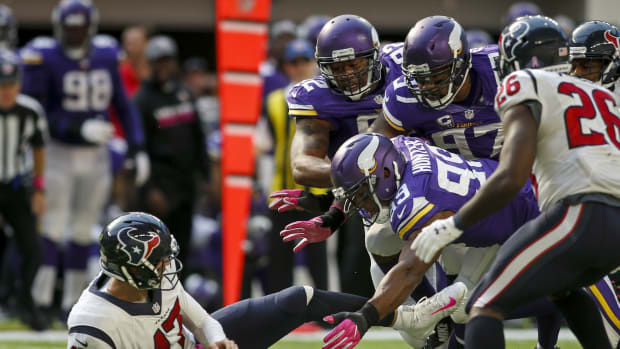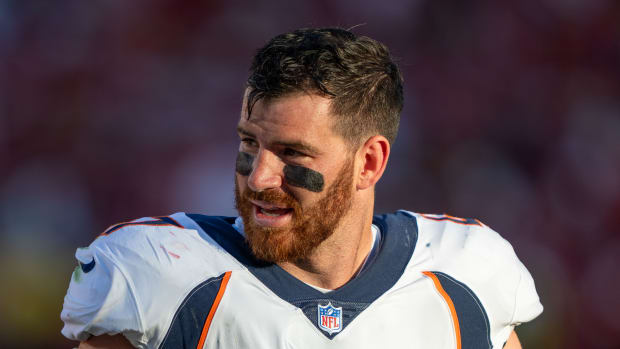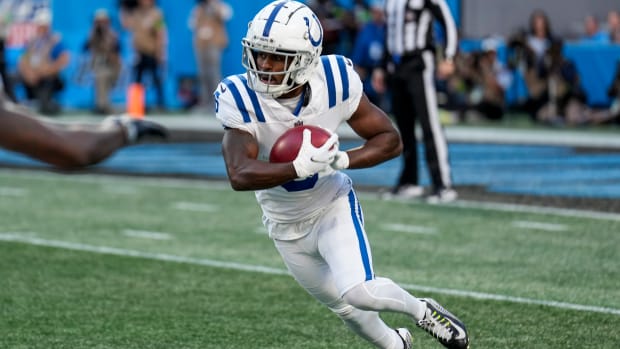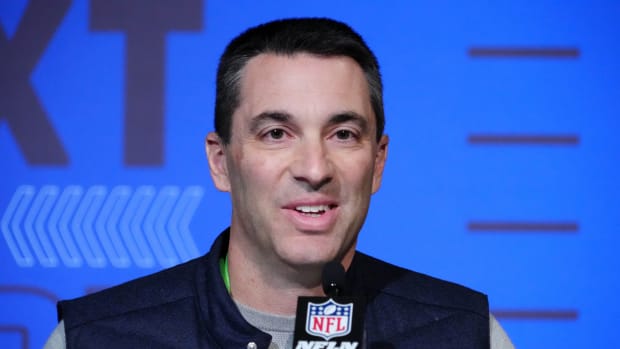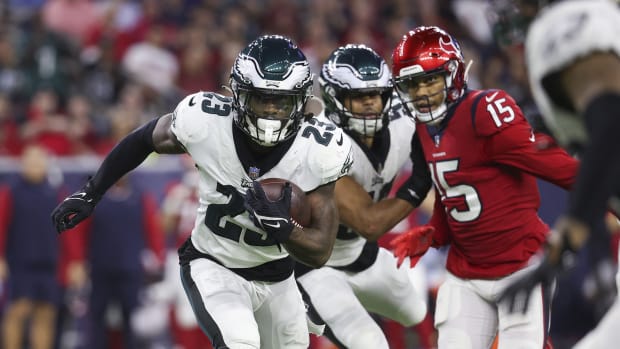Jon Gruden Isn’t Afraid to Do Something Wild
Two training camps ago, we got in touch with a handful of Jon Gruden’s former players from the Buccaneers to talk about the man they remembered and the one they thought might reemerge on the sidelines in Oakland. Jeff Garcia, who took a majority of the snaps for Gruden’s last two teams in Tampa, recalled the unsettling vibe during the team’s 2008 training camp, which coincided with Gruden’s not-so-secret pursuit of Brett Favre (who would end up with the Jets despite Gruden's belief he’d locked Favre up).
It brought to light what we have always known about Gruden: He loves experienced, veteran quarterbacks. He won a Super Bowl with Brad Johnson. He had tremendous success with Rich Gannon. It’s hard not to think about Garcia now and wonder, as we barrel toward free agency, if Derek Carr feels the same way (even if it’s obvious to much of the football world that Carr is a top-tier starter who can win football games). Tom Brady is on the market. Philip Rivers is on the market. Ryan Tannehill, fresh off a well-deserved, on-field image reshaping campaign, is on the market.
When a free-agency class is this big, people like Gruden, who should conceivably be on the outside looking in but may not be, could take this offseason from mildly entertaining to legitimately wild. And he’s not the only one. The central question in an offseason like this is, who, in a moment of situational desperation, falls back on the things they believe are necessary to get their team over the hump and end up risking a significant amount of capital to do so.
There are plenty of candidates …
• Maybe Gruden is desperate to microwave the Raiders’ long-term rebuild, as evidenced by some of the splashier acquisitions they made last year. I can also imagine the franchise being interested in fortifying some initial fanfare in their first year at a new stadium. Both of those things can be solved by landing a name befitting of a Las Vegas residency (again, that doesn’t make them a better team).
• Maybe Brady is desperate to prove that he is the greatest player in NFL history both inside and outside of the Patriots organization, meaning that he’ll leave the comfortable confines of Gillette Stadium and search for an emotional rejuvenation. Perhaps there is a desire to be courted for the first time in his career; chased by the highest bidders after taking less money (on paper) during his years in New England.
• Maybe one of the teams on the cusp of playoff/Super Bowl contention, like Indianapolis, Tennessee, Chicago, Tampa Bay and Jacksonville is desperate enough to uproot its current quarterback situations and explore what it feels is an upgrade. Any one of these moves would have a domino effect. A handful of these teams have connections to, or are ideally suited for, the now-available Philip Rivers.
And it doesn’t have to be just quarterbacks …
• Maybe Dave Gettleman, or any of the general managers of his ilk who watched the rise of the 49ers and feel emboldened to double down on the pass rush, is desperate enough to pay a premium for someone like Jadeveon Clowney, who will hit the market as an unrestricted free agent and likely hopes to leapfrog Khalil Mack on the EDGE rusher market (the current highest average per year salary is $23.5 million). Von Miller’s tenuous contract situation could make him trade bait once again (for an extremely high premium). Melvin Ingram and Calais Campbell will be free agents next season, which always puts teams in a position to consider their short-term prospects before value declines at the trade deadline. Chris Jones, one of the best interior rushers in football, is an unrestricted free agent this offseason, as are high-production EDGE rushers like Shaquil Barrett, Yannick Ngakoue and Bud Dupree.
* * *
When a free agency class is this big, there is always one important question that is not being asked, even though it's often the most important: Who will be the opposite of desperate? Who will realize that, inevitably, there is some hidden value in this class underneath the top-tier talent? Here are four questions:
• Which team will pull a (reverse) Titans and develop Marcus Mariota? The Titans’ offensive scheme spent the last few seasons slowly moving away from Mariota. Ryan Tannehill’s success in the wide-zone, bootleg offense shouldn’t impact the perception of Mariota’s value, but it will. I think there’s an advantage for QB-needy teams here who don’t want to deal with the public courting of Tom Brady, who don’t want to sacrifice mobility by signing Philip Rivers, who don’t want to roll the dice on every snap by signing Jameis Winston, and who don’t have the trade capital or cap space to go after someone like Nick Foles or Derek Carr. Mariota is both accurate and mobile. Throughout his career he’s had to deal with constant change and a buffet of different schemes. There are coaches out there—cough, Chicago, cough—who could slide him in easily under the guise that Mariota is a high-quality backup and develop him into a weapon under center who could take over when the starter falters.
• Which receiver needy team is going to sit out the Amari Cooper bidding war and strike it rich with Robby Anderson? If the Bengals don’t franchise-tag A.J. Green and Green reaches the open market, he and Cooper will command top-end money from teams who are desperate to upgrade. Wide receiver was the precious metal of the trade deadline last year, turning names like Mohamed Sanu and Emmanuel Sanders into huge assets. That need didn’t disappear overnight, nor did the struggle to immediately develop collegiate talent. Anderson, as PFF noted in its free-agent preview, hasn’t been paired with a legitimate wide receiver/playmaker during his career for the Jets and is a downfield weapon who could unlock a team hoping to free up another talented wideout.
• Which team will lean toward the Baltimore Ravens’ personnel strategy and capitalize on tight end value? The APY on the league’s top three tight ends (Travis Kelce, Zach Ertz and Jordan Reed) are all below $10 million a season (until George Kittle’s extension throttles the market). This free-agency class doesn’t have a player at the Kelce/Ertz level, but it does feature some solid players (Hunter Henry, Austin Hooper, Eric Ebron, Greg Olsen) who can produce in the right offense and help create space for other playmakers.
• Which team will attack the offensive line class wisely? If I were the Jets or Browns, I’d be lining up outside the doors of Jack Conklin, Anthony Castonzo and Brandon Scherff while figuring out which one (or few) can be had at the right price (either that, or positioning themselves somewhere near suburban Washington, D.C., to catch any potential Trent Williams fallout). While most, if not all, in the class have battled injury issues, hitting on any of these three players and nabbing them for a portion of their remaining upside would be a marked upgrade over what is going to be available in the remaining tiers of free agency. The draft will be an excellent supplement here. The best value may still be in Andrew Whitworth, who has played excellent football through his age-37 season and shows no signs of slowing down.
• Question or comment? Email us at talkback@themmqb.com.
































